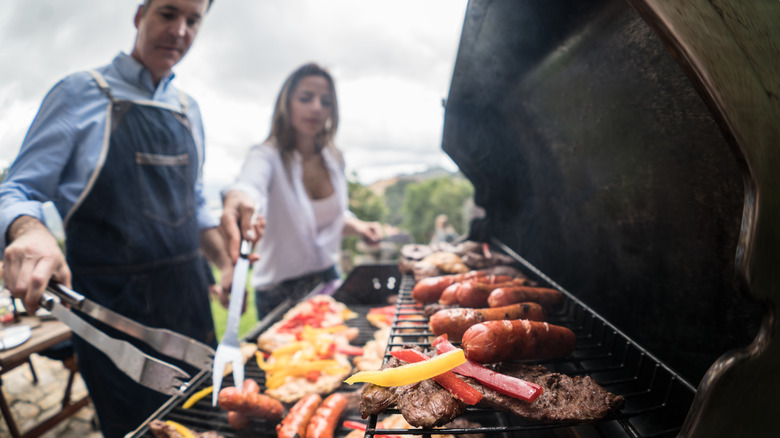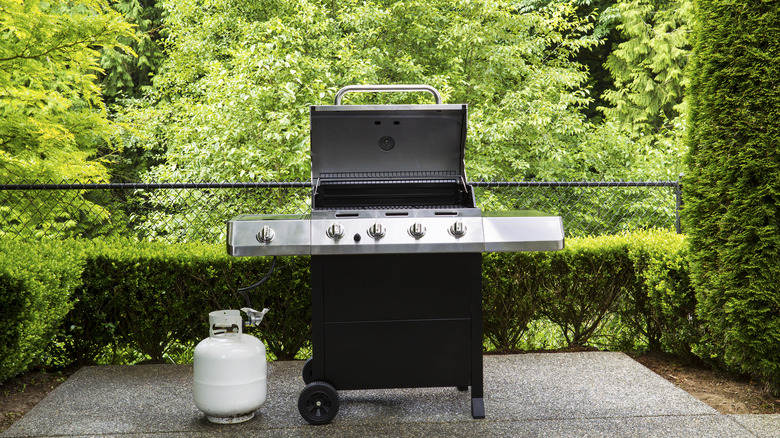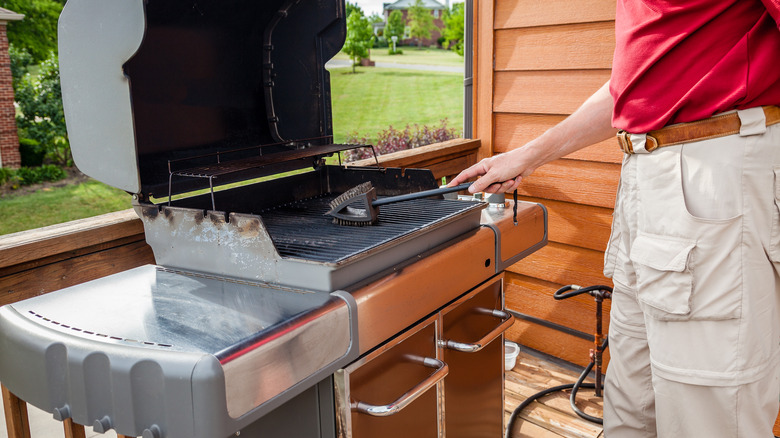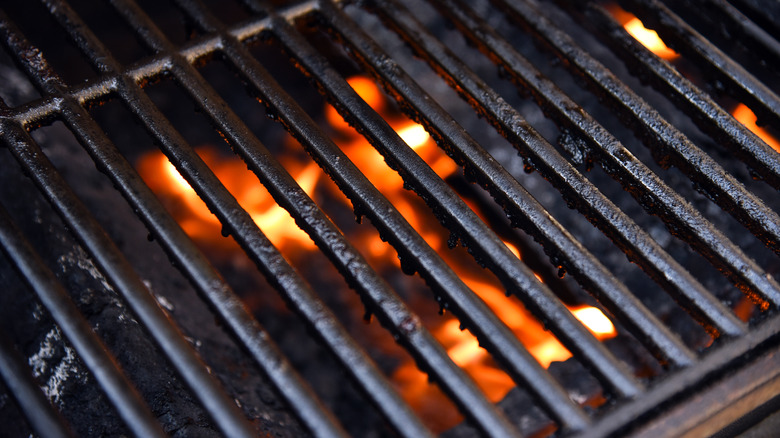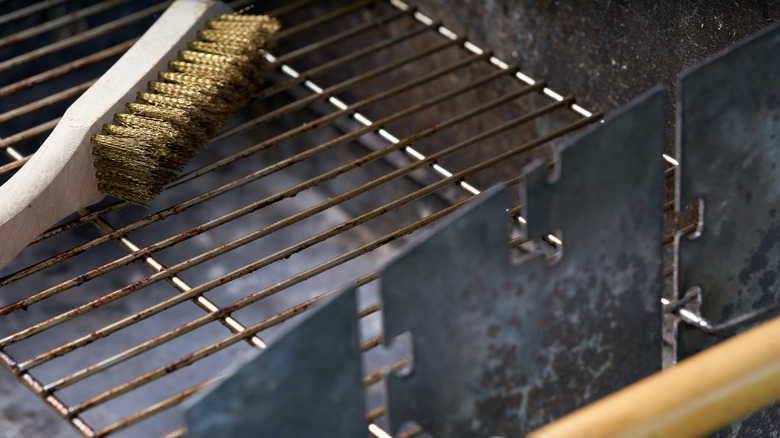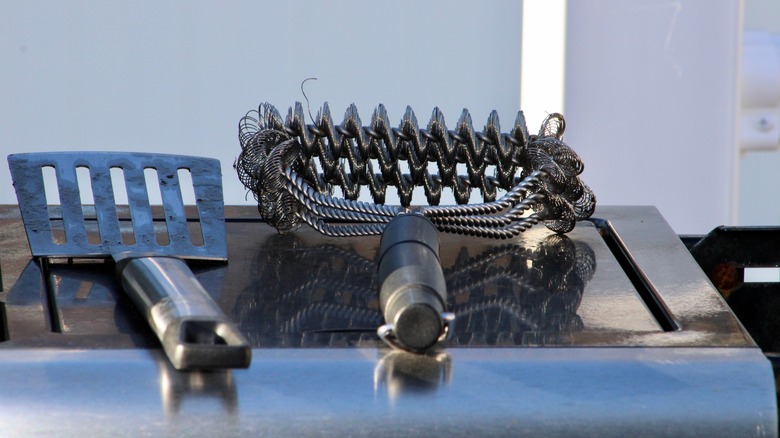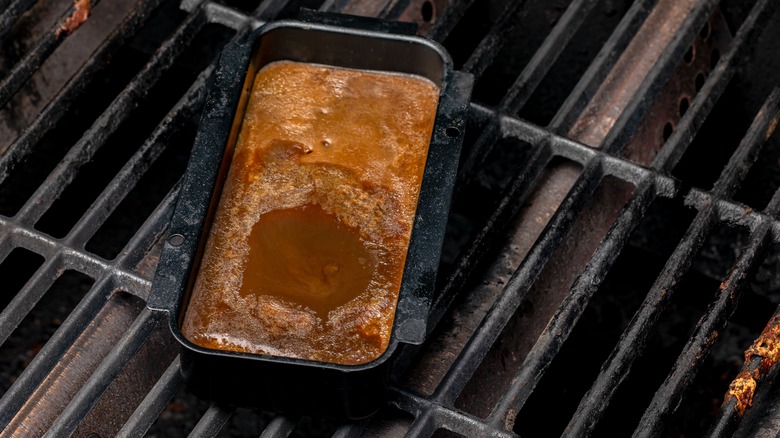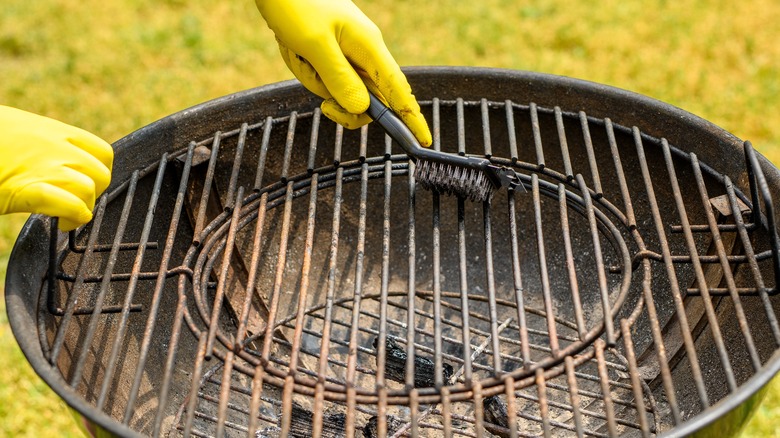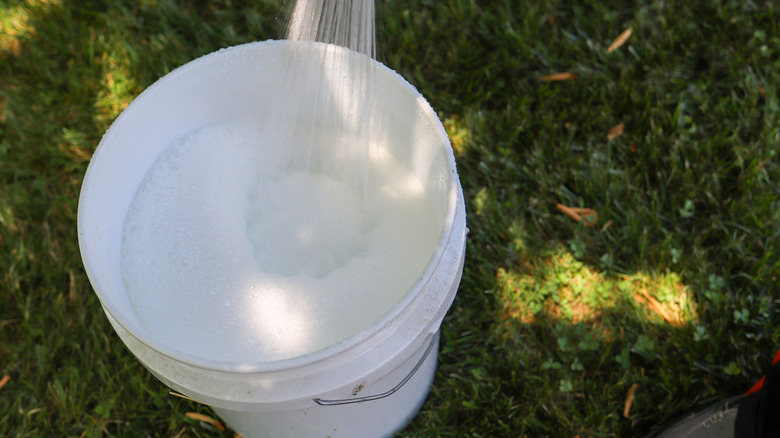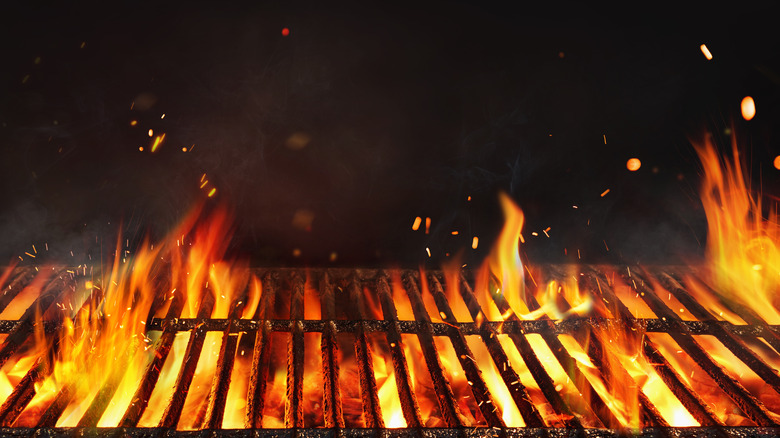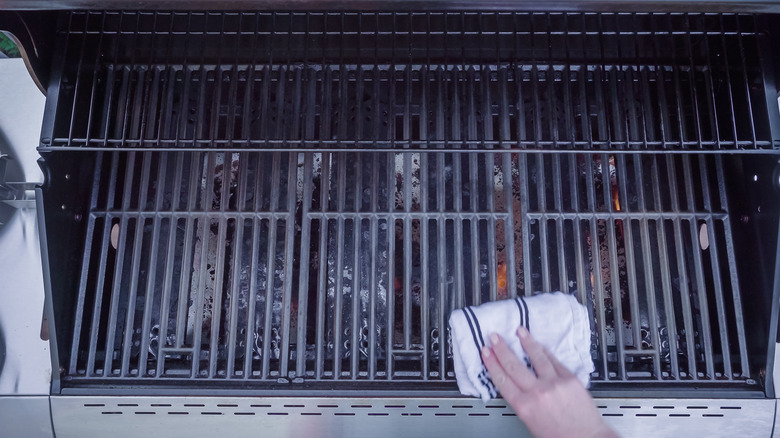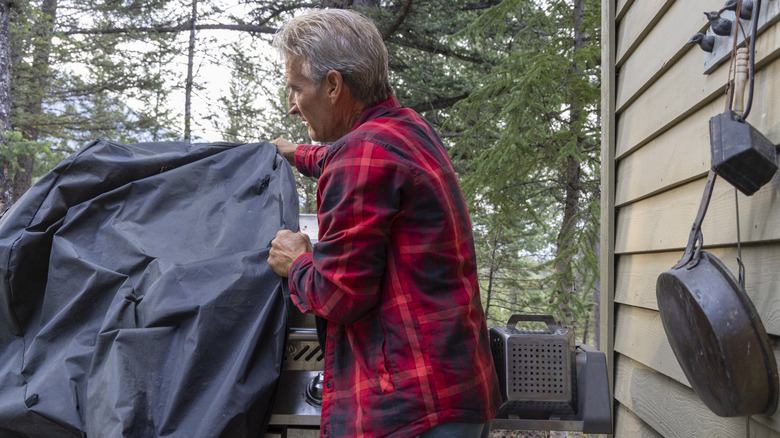Experts Warn Against Making These Big Mistakes When Cleaning Your Grill
Many of us have been there — you set up your grill in a safe spot, get your food prepped, and put it on the grill only to find it sticking to the grates. Not only do you have a huge mess, but you also are likely to lose out on dinner. And that may not be the worst of your troubles if your food isn't cooked correctly. While there may be specific reasons why your grill isn't functioning as it should, it could also be something as simple as needing a good cleaning.
It may not sound appealing to get your scraper out before chowing down, but experts say a clean grill is key. Poor cleaning choices can lead to long-term grill damage and in some cases, even be unsafe. Grill cleaning is super important from both a food safety perspective as well as to improve your grill's usability and life span.
We consulted with a couple experts to find out what big mistakes you should avoid when cleaning your grill and what you should do instead. By sticking to these expert cleaning tips, you'll be back to grillin' and chillin' at your barbecue in no time.
Not following the proper steps for cleaning your grill
The first consideration before you get started is to determine what type of grill you have so you can be sure to clean it properly. Gas grills light up immediately via propane, while charcoal grills use lump charcoal and a lighter to generate heat. Electric grills are also available.
While charcoal grills may appear simpler than a large gas grill with all the bells and whistles, the charcoal grills have their challenges when it comes to cleaning. For one, charcoal grills accumulate ash in a catcher or at the bottom of the grill. This ash can build up and block the grill's air vents, which can cause temperature control issues. That's why emptying the ash out of your grill after every use is an important step. You then scrape out the grease trap, brush your grill grates, and rub them down with a rag dipped in oil to keep rust off.
A gas grill allows you the option to turn up the heat to get those particles off your grill grates. "It's a lot easier to clean than a charcoal grill, in my opinion, since you don't have to worry about all that ash and residue," senior editor and culinary entrepreneur behind Carnivore Style, Gabrielle Yap, told Mashed. You also would tend to the gas burner tubes, take out the bottom pan to clean, if applicable, and clean outside the grill if you're doing a deep clean with stainless steel-friendly cleaners.
Not cleaning your grill immediately after cooking
Timing is everything with many grilling recipes – the same is true with grill cleaning. Arguably one of the biggest mistakes you can make is to not clean your grill right after cooking. Not only does that prevent you from forgetting to clean it all together, but the process is also easier when the grill is warm. "Many think it's okay to leave the mess for later, but this can lead to the buildup of stubborn residues that are much harder to clean," Gabrielle Yap of Carnivore Style said.
Above all, you should ensure you remove any food fragments stuck on the grill. Food left on a grill means more time to develop germs and potentially rot, making it unsanitary. The last thing you want is a risk of foodborne illness. By cleaning your grill right after cooking, you also remove any potentially harmful carcinogens linked to cancer from the charred remnants that might be left behind from cooking the fat on red meat. A good clean will prevent them from ending up on your next grilled meal.
And if you weren't convinced to start cleaning after grilling, know that all the built-up residue on your grill correlates to the grill's cooking capability. Your grill may not reach the correct temperature if you don't remove that residue, which also leads to possible fire flare-ups and inconsistent cooking. And what good is a meal that isn't as tasty as it can be?
Not preheating your grill before cleaning
Some experts say that an initial grate cleaning while the grill is cold can be an effective first step to cleaning your grill. If you go that route, try to get as much food residue off the grates before preheating your grill for the next step in the cleaning process. Once your grill is preheated to warm, you can brush your grates again, being careful not to burn yourself on the hot metal parts.
Although you can do a cold clean, cleaning your grill while the grates have some temperature to them provides the best results. "The best practice is to clean the grates while they're still warm, using a grill brush to remove food particles and grease. This not only makes the cleaning process easier but also prolongs the life of your grill by preventing rust and corrosion," Gabrielle Yap of Carnivore Style told Mashed.
Then you'll be ready for one of our many barbecue and grilling recipes for your next cookout.
Using the wrong type of grill brush
It's no secret that brushing your grill grates is an imperative part of cleaning. But just as important is using the correct grill brush. While a classic wire brush is known to be effective at cleaning, it can be potentially dangerous if it is not a high quality one — or if it's not properly cared for over time and it suffers from wear and tear. "Wire brushes are popular for their effectiveness, but if they start to wear out, bristles can break off and stick to the grill, potentially ending up in your food. This is a serious health hazard," Gabrielle Yap said. "Instead, choose a quality wire brush and inspect it frequently for signs of wear."
Wire brushes aren't the end-all-be-all. They can be too rough for stainless steel, porcelain, or ceramic grates and shouldn't be used on cast iron grates, which can create rust. Wire brushes have also gotten a bad reputation after several ingestion-related accidents due to fragments ending up in food.
If you want to avoid a wire brush completely, there are plenty of other options. Nylon-bristled brushes are a good choice for stainless steel grates; however, many say the nylon bristles don't have the same deep-cleaning power as a traditional stainless steel brush. There are even more creative options like a brush with a heat-resistant fiber fabric scrubber or a silicone-layered brush with stainless coils that are available from brand names like Cuisinart and OXO.
Forgetting to use a grill scraper
Another mistake is not using a dedicated grill scraper in addition to a grate brush. A grill scraper is ideal for those grills that have been neglected and haven't been cleaned in a while. There is probably some tough stuff on your grill grates that may not be feasible for just a grill brush to remove.
A lot of products combine a grill brush and scraper into one tool. The scraper mechanism can get that super stuck-on debris that bristles can't seem to crack. Plus, the tool typically has a longer handle, which allows you to scrape with more ease.
Gabrielle Yap recommends using a wooden scraper, which is a safer option for health reasons. There are scrapers made with hard wood (like birch), or soft wood (like cedar). The scrapers with the harder wood typically perform better and are of higher quality. There are also pumice stones specifically designed for grill cleaning that utilize the grit from the pumice to dislodge the food stuck on the grates. As for how much to scrape or scrub? It can depend on your strength level and the grime build-up. "Aim for at least 5-10 good scrubs with your brush or scraper. That should loosen up any food residue and get those grates shining like new!" Yap said. "Just be gentle. You don't want to damage those grates."
Ignoring the grease trap on your grill
An integral part of your cleaning should include emptying the grease trap on your grill. The grease trap can be located in different places on different types of grills, but most grills have some sort of grease trap or trough.
The grease trap does exactly what it sounds like — collects and traps the fat that is dispelled from your food while cooking. A big mistake when cleaning your grill is forgetting to empty that trap. That's because large pools of grease mixed with fire is a recipe for disaster. "The grease trap can quickly become a fire hazard if not emptied regularly," said Vanessa Terra Bossart, owner of GreenTerra Cleaning. "Make sure to clean the grease trap frequently to prevent dangerous flare-ups."
Grease buildup can also affect the flavor of your food and could prevent the grill from properly heating. For large smoker grills, you may want to consider using a drip pan cover or foil for easier cleanup. Just remember to change out the pan or foil covering when the pan is more than half full.
Using a chemical-based grill cleaner
You have probably seen a variety of grill cleaners at the store. Since they are advertised specifically for grills, it can be tempting to give those a try. But Gabrielle Yap says one of the most common mistakes is using these harsh chemical cleaners catered toward grills; some products aren't good for your grill — or for your food, for that matter. Chemical-based cleaners can damage your grill grates. Those chemicals can also transfer onto your food. "While it might seem like a quick fix to get rid of tough grime, these chemicals can leave residues that affect the flavor of your food and even pose health risks," Yap said.
So what should you use instead of grill cleaners? Soap and water or a mixture of vinegar and baking soda can cut through grease, according to Yap. Household food items like onions can even serve as a natural cleaner. "Cut an onion in half and rub it on the hot grates," said Vanessa Terra Bossart of GreenTerra Cleaning. "The natural enzymes help break down grease and grime, making it a simple, chemical-free cleaning method."
If you're set on using a grill cleaner, Yap says there are eco-friendly options like plant-based, non-toxic cleaners from Green Earth Technologies' G-Clean line. "I'm a big fan of Simple Green's Heavy-Duty BBQ and Grill Cleaner. It's easy to use and doesn't leave any harsh chemicals behind," Yap said. "Plus, it's safe for all grill surfaces, including stainless steel."
Skipping a deep soak of your grill grates
Does your grill have spots that don't seem to come clean no matter how much you scrape or brush? Soaking your grill grates can be a necessary step that you don't want to skip, especially when you have some tough messes.
All you need is to get a big bucket or tub and fill it with warm water, dish soap, and a little baking soda. Once your grill has cooled, remove all the grates and the flavorizer bars, and submerge them in the water. Flavorizer bars often need deep cleaning because they direct the grease drippings away from your grill's burner tubes for minimal flare-ups. The resulting smoke helps give your grilled foods extra flavor.
How long you choose to soak the parts is up to you — but experts say at least a few hours at minimum. "This loosens stubborn residue, making it easier to scrub off," Vanessa Terra Bossart told Mashed. You can even do multiple soaks during your cleaning process for those hard-to-get-off messes. You can also do a final soak overnight with vinegar and baking soda. After letting the parts soak for about 12 hours, you can rinse your grates with cold water and wipe away anything left behind.
Not seasoning your grill
If you're a cast-iron skillet user, you are likely familiar with the act of "seasoning." If you haven't heard of it before, put down the salt and pepper — this is a different kind of seasoning. Seasoning is the act of using oil to wipe down your grill grate, and it is done as a final maintenance step after scrubbing your grill grates clean.
"Just like a cast iron skillet, grill grates benefit from being seasoned to prevent rust and create a non-stick surface," Gabrielle Yap said. "After cleaning, lightly coat the grates with a high smoke point oil, such as canola or grapeseed oil, and heat the grill for a few minutes. This simple step helps maintain your grill in top condition and enhances the flavor of your grilled foods."
Peanut oil can also be an option for grill seasoning, according to Vanessa Terra Bossart. You can use a clean rag to apply the oil, but watch that your hands don't get burned from the hot grill grates. Also be sure to not use too much oil when seasoning your grill. Too much oil on your grill grates can cause flare-ups during cooking. You also want to be sure to not overheat the grill before seasoning, as the high heat can cause oil to burn off and leave soot behind.
Not cleaning burners and the interior of your grill
Many people are so focused on the grill grates and grill scraping that they forget about the many other parts of the grill — particularly in gas grills. You may not realize it, but other parts of your grill can collect that same buildup over time, affecting your grill's performance. "Focusing solely on the grates can overlook critical areas where grease and food particles accumulate. Over time, this can cause blockages and affect the grill's performance," Gabrielle Yap told Mashed. "To avoid this, make sure to periodically disassemble parts of your grill and clean them thoroughly. Use a soft brush to scrub the burners and a damp cloth to wipe down the interior. This ensures your grill operates efficiently and prevents flare-ups."
If not cleaned, those blockages can leave you with hot and cold spots on your grill. Now you are dealing with issues with cooking times and overall consistency of how your food is grilled.
If you really want to be sure to get all the gunk out of your grill, there are some other techniques to try. You can utilize a tool like a wet/dry vacuum — particularly for the main body of your grill, which is also called the firebox. These specific vacuums are typically used outdoors.
Not covering the grill outside
While this isn't necessarily part of the cleaning, covering your grill when it's not in use can be a good way to prevent it from getting dirty in the first place. "Failing to cover your grill after cleaning exposes it to the elements, leading to rust and wear," Vanessa Terra Bossart of GreenTerra Cleaning said. "Always cover your grill when not in use to protect it from rain, snow, and sun."
There are tons of grill covers on the market catered toward specific grill types. A basic rule of thumb is to select weather-resistant material for durability with venting to reduce condensation. The key is to be sure that your grill is entirely covered. Your grill manufacturer likely has a dedicated grill cover available for purchase.
Not only does a grill cover keep the exterior of your grill clean, but it can also prevent rust in the long run by keeping any moisture out. And while a cover isn't guaranteed to keep pests away, it can certainly help deter them if there's no easy to access your grill.
